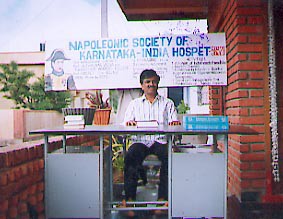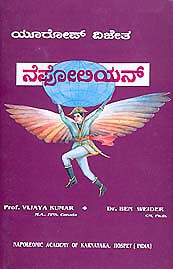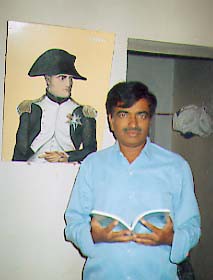Peter Hicks: I’m sorry to reveal my ignorance, but where is Karnataka?
Vijaya Kumar: It’s in South India, with the states of Maharashtra to the North West, Andhra Pradesh to the East, Madras to the South and South East and Kerala to the south west. It covers about 192,000 km2 and contains districts such as Bangalore, Kolar, Tumakar, etc. The official language is Kanada, followed by Hindi, Telugu, Marati and Urdu, but English is the lingua franca. The region is highly developed agriculturally speaking, and it has a remarkable history dating back to the stone age. And if we go forward to Napoleonic times there are the British and French East India companies, and of course the heroic Tippoo Sultan. With nine universities, the area is also well served educationally speaking.
P.H.: You work at the Theosophical Women’s First Grade College in Hospet. What is a Theosophical College?
V.K.: The college is a well-known educational establishment dedicated to the ideals and philosophy of Theosophy [a religio-philosophical movement begun in New York (USA) circa 1875 by Helena Petrovna Blavatsky (1831-1891) – ed.]. Since the Napoleonic Society of Karnataka has no official office and since I am teacher and head of the history department at the college, the society takes the address of the college. Indeed, the college in Hospet boasts a great number of students and teachers interested in European and Napoleonic history. In fact we have units on the French Revolution, the Napoleonic era and the Vienna Congress as part of our courses.
P.H.: Are there many other Napoleonic societies in India?
V.K.: No. There are obviously many such societies in Europe, but we are the only one on the Indian subcontinent. Our aim is to communicate to the young people in both Karnataka and India the idea of Napoleon’s winning spirit.
P.H.: What sort of activities do you run?
V.K.: We have held both talks and seminars in the college and they have all been very successful. And as president of the society, I have given addresses in many colleges in Karnataka, not to mention broadcasts on Hospet and Raichur local All India FM radio stations, and articles on the society printed in the leading state newspapers. The society itself meets once a month and organises meetings on divers Napoleonic subjects in different parts the state. We do have plans to form other Napoleonic groups elsewhere in India and we have already decided on some places with which to start. In fact there is a great deal of interest in Napoleon in India. Samudra Gupta, the king of the ancient Gupta dynasty, is known as an Indian Napoleon. Tippoo Sultan, the warrior of Karnataka (also known as the Tiger of Karnataka) was the ruler of Mysore and had close links with the Napoleon and there are many documents which show their friendship. Mahatma Gandhi was also linked with Napoleon. On seeing Gandhi defy the British salt restriction, Subhas Chandra Bose, the Indian revolutionary fighter who fought with the Nazis and the Japanese against the British in India during WWII, compared Gandhi to Napoleon returning from Elba.
P.H.: Is it not true that there used to be significant Indian interest in France?
V.K.: Of course there used to be a French colony in Pondicherry. Pondicherry is in the Bay of Bengal in South India. It was originally the headquarters of the French East India Company. Still today there is the Roman Ramoleno Library which was founded during those times. It is a popular library with a large collection of books on Napoleonic and French history. There is also the Indian French Institute with its grand project of translating Indian literature into French and vice versa. It is remarkable to think that some of the older residents of Pondicherry still have French/Indian double nationality. Napoleon’s general Dupleix was honoured with a bronze life-size statue erected in the town. Items from the French Revolution and the Napoleonic period are held in the Sular Jung Museum of Hyderabad. The Museum of Patna owns one of the emperor’s coats.
P.H.: And what about yourself?
 V.K.: Well, I am a lecturer by profession and an inveterate history enthusiast. At the age of 30 I was bitten by the Napoleon bug and it is from there that my Napoleonic book collecting began. I now have a large collection of books, articles, pamphlets. People started to come to me with their questions on Napoleon and we formed a small Napoleonic study group. I gradually began giving more and more lectures – at one point a young schoolboy who had come to the talk decided to change his name to Napoleon! – and it was then that we decided to form the society with the aim of inspiring young people and encouraging interest in Napoleon.
V.K.: Well, I am a lecturer by profession and an inveterate history enthusiast. At the age of 30 I was bitten by the Napoleon bug and it is from there that my Napoleonic book collecting began. I now have a large collection of books, articles, pamphlets. People started to come to me with their questions on Napoleon and we formed a small Napoleonic study group. I gradually began giving more and more lectures – at one point a young schoolboy who had come to the talk decided to change his name to Napoleon! – and it was then that we decided to form the society with the aim of inspiring young people and encouraging interest in Napoleon.
These days we’re a fully-fledged society. One of my colleagues, Mr Kalappa, even looks like Napoleon, in both stature and face, and for me he is an inspirational model of the emperor! I am an ardent follower of the emperor and I always apply the emperor’s maxims to my daily life. For example, on my 60 kilometre motorbike ride every day from home to the college (which includes a river crossing by local boat!), I amuse myself thinking of expressions such as ‘The word impossible cannot be found in the dictionary’, and remembering his words on the higher emotions of human beings. I also try to imitate his determination, his readiness to accept any challenge, his determination to fight for the cause, to overcome all obstacles and to reach his goal.
P.H.: I believe that you have written a book on Napoleon.
V.K.: Yes, the title is Europe Vijeta Napoleon (Napoleon, conqueror of Europe). It deals with Napoleon’s rise to power and his exile on St Helena – there’s also the text of Ben Weider’s article “The Assassination of Napoleon”. The book itself is aimed at the general public and undergraduate students and is published by the Napoleon Academy of Karnataka, a literary branch of our society. It costs five dollars for people overseas and can be ordered from the society. In fact, it was a result of my inclusion of Ben Weider’s essay in my book that I became a fellow of the International Napoleonic Society and that I translated that essay into Kanada, Telugu and Hindi.
P.H.: What are your plans for the future?
V.K.: We’ve got many different ideas. First of all we want to set up an ‘Indo-French Educational Cultural Tourist Centre’ near Hampi, a site much visited by Europeans. We also aim to provide decent and reasonably-priced accommodation for tourists. We wish to help the blind, disabled and orphans, notably telling them more about Napoleon. Indeed, one of our projects for the blind is to have Ben Weider’s book The Murder of Napoleon, written in brail. We also have plans to make a Napoleonic calendar including details regarding Napoleon’s life and also the life of the society. These are just a few of the details. There’s lots more besides…
For all those wishing to contact the Karnataka Napoleonic society:
Prof Vijaya Kumar
President of the Napoleonic Society of Karnataka
Theosophical Women’s First Grade College
Hampi Road
HOSPET – 583 201
Bellary District
Karnataka India
Tel.: 8-30am to 11-30am (office) +91 – 8394 – 28331, 4pm to 4-30pm +91 – 8533 – 73534
Email: vijaygvt@usa.net
Select Bibliography
• Europe vijeta Napoleon, Napoleonic Academy of Karnataka, Hospet (India), 1998, XVI + 224p
• Vivahada vyuhadalli Napoleon, a translation into Kannada of the story of Napoleon’s marriage to Marie-Louise, Jananamanjari and Marmaveera, 1998
• Pustaka premi Napoleon (Napoleon the book lover), Bisilu Baduku, 1998



